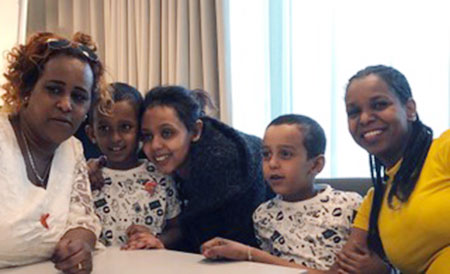Background
Many of DRW’s1 participants, disabled migrants, have more difficulties in getting the daily life to function due to Covid 19. These people have come to Sweden during the refugee crisis and have so far not had the chance to learn good Swedish or build a stable everyday life. This is due to many things but mainly to inaccessible housing, the lack of social benefits and a lacking social network. Many of the DRW participants have not had the opportunity to receive basic education in their home countries due to stigma and guilt towards disabled people and low expectations of the group.
Many of these people live in socio-economically marginalised areas and have difficulty leaving their homes leaving them isolated. Those who live with relatives find it more difficult to keep distance from each other due to overcrowded living arrangements. Undocumented persons often fall through the net of healthcare and preventive care interventions. Access to vehicles and larger shopping areas are lacking.
All of these factors complicate the situation for most of the DRW participants during the Covid 19 crisis.
Covid 19 – a challenge
Covid 19 is a challenge. Before the Covid 19 pandemic, many of the DRW participants received support from relatives, friends or volunteers. It was physical and practical support with shopping, carrying, moving and other things to make daily life function. Last but not least, they had people with whom they socialized, this is very important. The people who help and support make the participants feel better. Now with Corona and isolation at home, these individuals do not get the support or companionship they usually get from friends or volunteers, which makes them feel worse and worse.
There is a lot of worry and stress around Corona. Many find it difficult to understand what is happening, what the public health authorities are saying during the regular press conferences and the news from other authorities. Most participants speak limited Swedish and do not follow the developments of the society during Corona. This causes increased anxiety and stress.
Many of these people have no extra money to buy a computer or phones with a sufficient technology standard. The social services do not pay for internet or mobile subscriptions but require to be reached by phone or email. Many of the DRW participants do not receive support to buy food. People who, with the help of friends or volunteers, could buy food from cheap shops but are now forced to buy more expensive food from neighboring shops.
Most are dependent on support and services from the authorities. Individuals need to apply for support and benefits and then report how and for what they have used the money. Daily contact and communication with administrators, healthcare staff, schools etc. is needed. Different documents must be filled in and submitted like applications, proof of costs or proof of payments to receive benefits or care support.
Now with Corona, most receptions are closed and communication is digital. To be able to take part in the digital world, equipment and knowledge are required. It is not easy for many of the DRW participants, disabled migrants, who lack both equipment and knowledge in using the equipment. Support to understand what is required, the language or how a computer and different programs work is lacking.
What do DRW participants need?
The needs are many as described above, but regarding Corona there are additional needs like:
-
- Education and training to reduce the lack of knowledge on the digital world;
- Extra support to enable the acquisition of necessary technology;
- Compensation for lost personal support under Corona;
Lack of support hinders integration and increases illness. DRW tries to support people to reduce obstacles and illness.
What does DRW do under Corona?
DRW continues the work and support those who seek help. The team contacts and supports the project participants. Telephone calls and meetings are conducted and when necessary with social distancing. DRW has supported several individuals with training on digital knowledge. DRW is looking for economic possibilities for participants to access computers, smartphones and own internet to increase their digital communication.
DRW works to build up its volunteer activities and encourage participants to contact DRW’s volunteers or mentors. During the autumn, DRW will continue creating opportunities for e.g. family matching with the group. DRW contacts organizations to find resources to be able to continue the work with the more than 100 participants in the project.
DRW and the Future
During the last three years, DRW has only scratched the surface of the area of migration, disability and integration. Corona has made it more difficult for integration of the participants. DRW continues to expand the network, to find ways to promote mutual integration and to combat obstacles caused by Corona.
13th of July
Jamie Bolling – Project Leader DRW
and
Rahel Abebaw Atnafu – Advisor DRW
——————-
